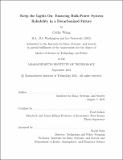Keep the Lights On: Ensuring Bulk-Power System Reliability in a Decarbonized Future
Author(s)
Wang, Cathy
DownloadThesis PDF (5.735Mb)
Advisor
Joskow, Paul
Terms of use
Metadata
Show full item recordAbstract
Policy and market forces are ushering in a new power system, one dominated by variable renewable energy (VRE) resources (wind and solar) and energy-limited resources like energy storage. Because these resources have different characteristics than the conventional thermal generators that make up the bulk of our capacity mix currently, this capacity turnover necessitates new ways of thinking about and planning for bulk-power system reliability.
This Thesis evaluates the modeling approaches currently used in capacity planning and resource adequacy frameworks, and proposes a new iterative approach to incorporating cost-efficiency, decarbonization, and reliability goals into capacity and resource adequacy planning. As recent large-scale blackout events in California and Texas illustrate, both demand and supply can be heavily impacted by extreme weather events, contributing to more conditions of system stress in the years to come.
By carefully taking into account periods of high risks of incurring reliability shortfalls, we show that actual reliability can be greatly improved in a systems analysis, compared to separate planning and resource adequacy analyses. Going forward, we need to find better ways of capturing the variations and correlations between time-coincident VRE output, load realizations, and unplanned thermal generator outages, to appropriately characterize and communicate the risks of power supply shortfalls (i.e., duration, frequency, magnitude). This has key implications on how end-use customers think about losing power for some period of time, how much they are willing to pay for customer-side reliability, and how their preferences are reflected at the system level.
Date issued
2021-09Department
Massachusetts Institute of Technology. Institute for Data, Systems, and Society; Technology and Policy ProgramPublisher
Massachusetts Institute of Technology